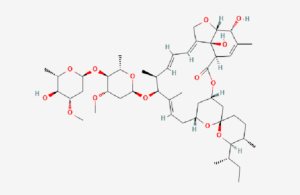
[Image courtesy of PubChem]
Participants in a Phase 3 COVID-19 study who received the antiparasitic ivermectin fared about as well as those who got a placebo. Ivermectin recipients recovered in a median time of 12 days, while placebo recipients convalesced in 13 days on average.
The data from the ongoing ACTIV-6 study were published in JAMA. The study authors concluded that ivermectin did not “significantly improve time to recovery.” The article concluded that the “findings do not support the use of ivermectin in patients with mild to moderate COVID-19.”
Across all arms, the study involved 1,591 vaccinated and unvaccinated participants with mild to moderate COVID-19.
Recipients in the ivermectin arm received 400 μg/kg of ivermectin for three consecutive days.
The ACTIV-6 study was performed when the delta and omicron variants were the main drivers of COVID-19 infections.
Patients in the study were recruited at 93 sites located in the U.S.
The ACTIV-6 study also tested the efficacy of the antidepressant fluvoxamine (Luvox) and the inhaled steroid fluticasone. Neither bested placebo.
In 2020, in vitro data suggested that ivermectin may be a potential COVID-19 therapy.
Last year, a meta-analysis published in Open Forum Infectious Diseases found some benefit of ivermectin, concluding that recipients of the antiparasitic had a 56% reduced mortality risk in patients infected with COVID-19.
Earlier in 2021, an article in the American Journal of Therapeutics mused that ivermectin could curb the risk of COVID-19-related death with moderate-certainty evidence.
The Brazilian TOGETHER trial, the most extensive randomized, outpatient study thus far to date focused on ivermectin in COVID-19, found no benefit from 400 μg/kg for three consecutive days in patients with mild to moderate coronavirus infections.
FDA has concluded that ivermectin is ineffective against COVID-19. In addition, the agency noted that some consumers taking animal formulations of ivermectin required hospitalization.
CDC has also warned against using ivermectin to treat the novel coronavirus, noting that the most common adverse reactions associated with ivermectin involved neurological toxicity.
A handful of doctors have prescribed ivermectin as an experimental COVID-19 treatment. Among them is the Ukrainian-American doctor Vladimir Zelenko, who prescribed the drug along with zinc and azithromycin. The controversial physicians’ group, America’s Frontline Doctors, has also backed ivermectin as a COVID-19 therapy. Doctors associated with the group made millions by prescribing ivermectin and the malaria drug hydroxychloroquine to COVID-19 patients, according to The Intercept.